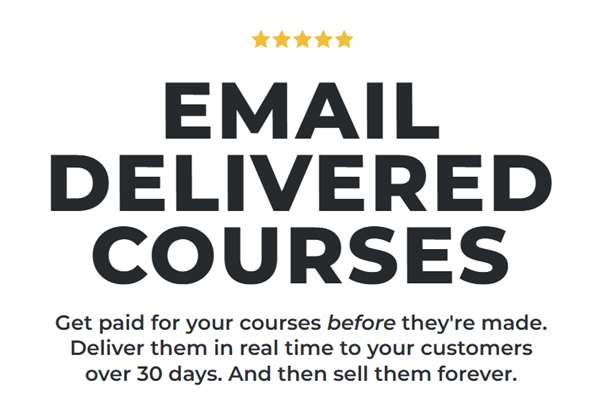Derek Johanson – Email Delivered Course System [Dec 2024]
$297.00 Original price was: $297.00.$45.00Current price is: $45.00.
- Delivery: You Will Receive A Receipt With Download Link Through Email.
- If you need more proof ofcourse, feel free to chat with me!

Sales Page: https://www.emaildeliveredcourses.com/
Delivery Time: 12 - 24hrs after paidDescription
Table of Contents
ToggleUnlocking Success with Derek Johanson’s Email Delivered Course System – An In-Depth Exploration. Derek Johanson has revolutionized the way solopreneurs approach course creation with his innovative Email Delivered Course system. This method shifts the traditional paradigm of creating online courses by emphasizing pre-selling and real-time development, thus minimizing risk while maximizing engagement. In this comprehensive guide, we’ll explore this dynamic approach to course creation, detailing its critical components, benefits, and practical implementation strategies.

Introduction to Email Delivered Courses
The concept of Email Delivered Courses (EDC) is a game-changer for those looking to create and sell digital courses efficiently. By reframing the process of course creation, Derek Johanson opens new avenues for solopreneurs to monetize their expertise without the risks associated with traditional course development.
The Concept Behind the Method
At its core, the Email Delivered Course system revolves around the idea of creating and selling educational content in a reverse fashion. Instead of spending countless hours developing a course only to discover there’s little market interest, EDC encourages instructors to gauge demand by pre-selling their course idea. This approach not only validates the course concept but also sets the stage for ongoing interaction and improvement based on customer feedback.
Furthermore, the methodology promotes a low-stress environment where course creators can focus on delivering valuable content incrementally. By breaking down lessons into manageable daily emails, students receive information in digestible portions, making it easier for them to absorb and implement what they learn.
Target Audience Overview
The Email Delivered Course system primarily targets solopreneurs—individuals who operate their businesses independently and seek to share their knowledge or skills through online courses. It appeals to both seasoned experts and newcomers alike, offering a straightforward path to course creation that bypasses many technological hurdles typically faced by aspiring educators.
Moreover, the model’s emphasis on simplicity makes it particularly attractive to those who may feel overwhelmed by traditional course development processes. With just a sales page and an email delivery system, solopreneurs can dive into course creation without needing extensive technical skills or resources.
Understanding the Reverse Course Creation Model
To fully grasp the power of Derek Johanson’s methodology, it’s essential to delve deeper into the Reverse Course Creation Model. This framework underpins the effectiveness of the Email Delivered Course system, guiding creators from initial concept to successful launch.
Pre-Selling Before Content Creation
Pre-selling is the standout feature of the EDC method. By gauging interest before any content is produced, course creators significantly reduce the risk of investing time and energy into an unmarketable course. This proactive approach allows entrepreneurs to validate their ideas through actual sales rather than speculation.
To successfully implement pre-selling, solopreneurs first need to articulate their course concept compellingly. Crafting a persuasive sales page that outlines key benefits can drive interest and encourage potential customers to commit financially, even before the course has been developed.
Once pre-sales have begun, creators can then refine their course outline based on incoming feedback, ensuring that the final product meets the needs and expectations of paying customers.
Real-Time Development Explained
One of the most significant advantages of the Email Delivered Course system is its focus on real-time development. After validating demand through pre-sales, course creators can begin constructing the course content in small, digestible segments, typically delivered via email over a 30-45 day timeframe.
This real-time approach fosters a dynamic learning environment where students can provide feedback as they progress through the course. Such responsiveness empowers creators to tweak content and messaging according to audience preferences, ensuring the material remains relevant and valuable throughout the delivery process.
Additionally, this iterative development model helps build rapport between instructors and students, as learners feel their input directly influences the course progression. When students see their suggestions implemented, they are more likely to stay engaged and committed to the learning experience.
Risk Mitigation in Course Creation
Risk is often a paramount concern for anyone venturing into course creation. Derek Johanson’s Email Delivered Course system mitigates these worries through its structured approach. By front-loading the validation process with pre-sales, solopreneurs can avoid the pitfalls of wasted time and effort.
If, during the pre-sale phase, interest appears lukewarm, creators can opt to refund early buyers before they invest further in course development. This strategy ensures that time and resources are only devoted to projects with established demand, reducing the stress and anxiety often accompanying course launches.
Beyond financial risks, the iterative nature of EDC allows for a natural evolution of content. Continuous engagement with customers provides a safety net of support, making it easier for creators to pivot should they notice changing trends or feedback indicating a need for adjustments.
The Process of Email Delivery
The heart of the Email Delivered Course system lies in its unique delivery mechanism. Emphasizing drip-fed content, this approach transforms the traditional course delivery format into an engaging and enjoyable experience for learners.
Drip-Fed Content: Benefits and Strategies
Drip-fed content refers to the scheduled release of course material over time, rather than overwhelming students with all lessons at once. This technique not only enhances comprehension but also encourages sustained engagement.
By pacing the learning experience, learners can take the time to absorb each lesson thoroughly. As concepts accumulate, students can better integrate new knowledge into their existing understanding, ultimately leading to improved outcomes.
From a strategic standpoint, drip-fed content creates anticipation around each lesson. Students look forward to receiving their daily emails, fostering a sense of excitement and commitment to the course journey. This engagement translates into higher open rates and completion rates, driving success for both the instructor and the learner.
Engagement through Daily Lessons
Daily lessons serve as a powerful tool for maintaining student engagement. With content delivered consistently, students develop a routine that reinforces their commitment to the course.
Moreover, the predictability of a daily email fosters loyalty among subscribers. They begin to associate the instructor’s content with valuable insights and actionable advice, resulting in a heightened appreciation for the course material. Additionally, when students feel personally connected to the content, they are more likely to share that enthusiasm within their networks, expanding the reach of the course.
As each lesson unfolds, the opportunity arises for students to practice and implement what they’ve learned. This active involvement solidifies the learning experience and increases the likelihood of retention long after the course concludes.
Control Over Course Messaging
Instructors using the Email Delivered Course system maintain full control over the messaging and tone of their communications. Unlike traditional course formats that often rely on elaborate video presentations or written materials, daily emails allow course creators to present themselves authentically.
This authenticity extends beyond subject matter expertise; it encapsulates the creator’s personality and voice. In doing so, instructors cultivate a relatable image, which resonates well with students and fosters trust. When learners perceive their instructor as genuine and accessible, they are more inclined to engage deeply with the material and participate actively in discussions.
Furthermore, by having the flexibility to modify content based on student feedback, course creators can ensure that their messaging aligns with audience needs and preferences. This adaptability not only enhances the overall quality of the course but also strengthens the connection between instructor and student.
Building a Responsive Mailing List
A key aspect of the Email Delivered Course system is the ability to build and maintain a responsive mailing list. Through consistent interaction with subscribers, solopreneurs can cultivate a highly engaged audience primed for future offerings.
Strategies for Engaging Subscribers
Engagement strategies play a vital role in transforming ordinary subscribers into devoted followers. One effective method is leveraging interactive content within the daily emails, such as polls, challenges, or Q&A sessions. These elements invite participation and empower subscribers to contribute their thoughts and experiences.
Additionally, personalizing communication can foster a deeper connection. By addressing recipients by name and incorporating relevant anecdotes, solopreneurs can demonstrate an investment in their audience’s success. Regularly encouraging feedback facilitates an open line of communication, allowing course creators to refine their approach continually based on subscriber input.
Lastly, the art of storytelling shouldn’t be overlooked. Sharing personal experiences and successes helps humanize the instructor, forging a bond with subscribers that transcends transactional relationships.
Transforming Subscribers into Customers
Building a responsive mailing list paves the way for converting subscribers into paying customers. To facilitate this transition, solopreneurs must instill confidence in their audience that they are delivering real value through their courses.
Offering free mini-courses or exclusive content can be an excellent way to showcase expertise while encouraging subscribers to make a financial commitment. Additionally, strategically timed promotions and exclusive offers create a sense of urgency that nudges subscribers toward purchasing decisions.
Moreover, transparency regarding the course development process can enhance trust and loyalty. By sharing behind-the-scenes updates, course creators allow subscribers to witness the journey, reinforcing their belief in the value being offered.
Solopreneur-Friendly Approach
The Email Delivered Course system’s design is particularly suited for solopreneurs seeking a streamlined approach to course creation and marketing. With a focus on low-tech solutions and efficient time management, this model enables individuals to thrive in the competitive online education landscape.
Low-Tech Solutions for Course Creation
One of the standout features of the Email Delivered Course system is its accessibility. Solopreneurs are not required to invest heavily in complex technological tools or platforms. A simple sales page coupled with an effective email marketing system suffices to kickstart the course creation process.
This low-tech approach removes barriers that may deter aspiring course creators from pursuing their objectives. The focus shifts from navigating intricate software to delivering high-quality content and valuable lessons to students.
Furthermore, the simplicity of the system allows solopreneurs to leverage pre-existing tools they are already familiar with. This familiarity increases confidence and reduces the learning curve, enabling creators to concentrate on refining their course content instead of becoming bogged down by technology.
Time Management for Course Creators
Time efficiency is paramount for solopreneurs managing multiple responsibilities. The Email Delivered Course system is designed to be time-efficient, requiring only 30-60 minutes of dedicated effort each day.
By breaking down course content into bite-sized lessons, course creators can easily allocate time for development without feeling overwhelmed. This structure also encourages consistency, as creating and sending daily emails becomes a manageable task.
Moreover, the iterative nature of the EDC model allows course creators to adjust their schedules as needed. If certain lessons require more attention or additional feedback, creators can adapt their daily plans to accommodate these demands without sacrificing overall productivity.
Scalability of the Email Delivered Course Model
Once established, the Email Delivered Course becomes an evergreen asset for solopreneurs. As courses are created and refined, they can be sold repeatedly, generating passive revenue streams that contribute to business growth.
This scalability is further enhanced by the cyclical nature of the EDC model. Each new course feeds back into the mailing list, drawing in fresh audiences and providing additional opportunities for cross-promotion and upselling.
By adopting this continuous feedback loop, solopreneurs can expand their course offerings over time, creating a suite of valuable products that cater to diverse customer needs. This not only boosts profit potential but also establishes the creator as an authority within their niche.
Types of Email Delivered Courses
Derek Johanson’s Email Delivered Course system accommodates various course types, allowing solopreneurs to tailor their approach based on their expertise and target audience. Understanding these distinctions is crucial for effectively implementing the EDC model.
Skill-Building Challenges
Skill-building challenges represent an ideal entry point for those who may be less experienced as instructors. These courses emphasize guiding students through specific skill acquisition processes, serving as curated pathways to achieving tangible goals.
Course creators curate content and facilitate accountability for participants, ensuring they remain on track throughout the challenge. This approach allows instructors to engage in meaningful interactions with students, fostering a supportive community that enhances the overall learning experience.
Moreover, skill-building challenges offer flexibility for solopreneurs, as they can leverage existing knowledge and experiences while empowering learners to achieve measurable outcomes.
Step-by-Step Method Courses
In contrast, step-by-step method courses cater to more seasoned experts looking to share their specialized knowledge. These courses provide detailed guidance on specific processes or methodologies, appealing to learners eager for comprehensive, structured training.
Instructors can break down complex topics into manageable lessons, allowing students to grasp intricate concepts more easily. By positioning themselves as knowledgeable guides, solopreneurs can build credibility and trust with their audience, enhancing the likelihood of future sales.
Furthermore, the step-by-step format lends itself well to expansion and iteration. As expertise evolves, course creators can continuously update lessons, ensuring their offerings remain current and relevant.
Detailed Course Outline
For those eager to implement the Email Delivered Course system, a comprehensive course outline serves as a roadmap for success. This structured approach will guide solopreneurs through each critical aspect of course creation, ensuring no stone is left unturned.
Module 1: Choosing the Right EDC Type
The first module centers on assisting participants in selecting the appropriate type of email delivered course for their unique business objectives. By exploring both skill-building challenges and step-by-step method courses, solopreneurs can identify which model aligns best with their expertise and target audience.
Module 2: Pre-Selling Your Course
Module two delves into the intricacies of pre-selling courses. Participants learn how to craft effective sales pages that outline the course’s value proposition while validating market demand before developing content.
Module 3: Strategies for Selling Your Course
Effective sales techniques are the focus of module three. Aspiring course creators will gain insight into confidently presenting their offerings to potential customers, utilizing persuasive language and actionable calls-to-action.
Module 4: Creating Addicting Content
Creating compelling content is vital for student satisfaction. In this module, solopreneurs learn how to develop high-quality lessons that resonate with subscribers and keep them engaged throughout the course duration.
Module 5: Designing a Skill-Building Challenge
The fifth module focuses on designing impactful skill-building challenges. Participants explore methods for curating content, setting clear goals, and promoting accountability, ensuring learners achieve desired outcomes.
Module 6: Nurturing Your Mailing List
Finally, module six emphasizes the importance of nurturing the mailing list. Solopreneurs will discover strategies for maintaining subscriber engagement and converting readers into loyal customers through personalized communication and ongoing interactions.
Essential Templates for Success
To streamline the implementation of the Email Delivered Course system, solopreneurs benefit from access to essential templates tailored for different stages of course development and marketing.
One Week Pre-Sell Sequence
A well-crafted pre-sell sequence template outlines the essential steps and messaging required to validate demand for a course effectively. This structured approach provides guidance on crafting compelling emails that entice potential buyers.
One Week Launch Sequence
The launch sequence template serves as a roadmap for course creators looking to unveil their offerings. From introductory announcements to promotional messages, these templates ensure a cohesive and strategic launch process.
Customer Survey Templates
Feedback is invaluable when iterating and improving course content. Customer survey templates help solopreneurs gather insights from participants, allowing them to refine their offerings and tailor future courses to their audience’s needs.
Guarantees and Risk Reduction Strategies
In addition to the inherent risk mitigation built into the Email Delivered Course system, solopreneurs can implement guarantees and strategies to further reduce perceived risk for potential buyers.
The 100x ROI Guarantee
The 100x ROI guarantee assures customers that they will receive value far exceeding the cost of the course. This powerful statement builds confidence, enticing prospects to enroll by eliminating concerns about financial waste.
Money-Back Guarantee for Peace of Mind
A money-back guarantee provides peace of mind for hesitant buyers. By offering refunds if customers are not satisfied with their purchase, solopreneurs reinforce their commitment to delivering quality content and customer satisfaction.
Testimonials and Success Stories
An essential component of establishing credibility is showcasing testimonials and success stories from individuals who have implemented the Email Delivered Course system.
Real-World Applications of the Method
Sharing real-world applications illustrates the transformative potential of the EDC methodology. Solopreneurs can highlight case studies showcasing successful course launches and satisfied customers, building trust with prospective students.
Impact on Course Creators’ Businesses
Testimonials from course creators who have utilized the Email Delivered Course system underscore its efficacy. Highlighting specific metrics related to revenue growth, engagement rates, and customer satisfaction can persuade others to adopt this innovative approach.
Advantages Over Traditional Course Creation Methods
The Email Delivered Course system offers several advantages over conventional course creation methods, making it an attractive choice for solopreneurs.
Flexibility in Course Development
Traditional course creation often mandates extensive upfront planning and content development. Conversely, the EDC model allows for greater flexibility, as course creators can iterate and adapt based on audience feedback, ultimately producing content that holds higher relevancy.
Enhanced Engagement and Feedback Loop
The EDC system establishes a robust feedback loop between instructors and students. By delivering content incrementally and encouraging interaction, creators can hone their craft while simultaneously fostering meaningful relationships with learners.
Common Misconceptions About Email Delivered Courses
As with any innovative approach, misconceptions can arise regarding the Email Delivered Course system.
Addressing Technological Fears
Some solopreneurs may hesitate to embrace the EDC model due to fears surrounding technology. However, the simplicity of the required tools—primarily an email service provider and a sales page—demystifies the process and empowers individuals to succeed without advanced technical prowess.
Clarifying the Perceived Complexity
Misunderstandings may also stem from misconceptions about the complexity of the EDC system itself. In reality, the structured outline provided in the course modules ensures that solopreneurs can navigate the process with ease and confidence.
Marketing Strategies for Email Delivered Courses
Effectively marketing an Email Delivered Course is essential for attracting subscribers and converting leads into customers. Implementing strategic marketing tactics will maximize visibility and engagement.
Building an Effective Sales Page
Crafting an effective sales page requires careful thought and attention to detail. Key elements include persuasive copy, testimonials, and a clear value proposition that showcases the benefits of enrolling in the course.
Leveraging Social Media for Promotion
Social media serves as a powerful tool for promoting the Email Delivered Course system. By sharing snippets of course content, success stories, and engaging with followers, solopreneurs can amplify their reach and attract new subscribers.
The Role of Community in Course Development
Community plays a pivotal role in the success of the Email Delivered Course system. By fostering peer accountability and collaboration, instructors can create a supportive environment for learners.
Fostering Peer Accountability
Encouraging participants to connect and hold one another accountable enhances the learning experience. Course creators can facilitate group discussions and activities, enabling learners to engage actively with the material and share their progress.
Encouraging Collaborative Learning
Collaboration fosters creativity and deepens the learning experience. By creating opportunities for group interactions, solopreneurs can harness the collective wisdom of participants, enriching the course for everyone involved.
Conclusion of the Email Delivered Course System
Derek Johanson’s Email Delivered Course system represents a revolutionary approach to course creation, providing solopreneurs with a proven framework for success. By embracing the principles of pre-selling, real-time development, and responsive engagement, aspiring educators can unlock the potential of their knowledge and skills.
With the advantages of reduced risk, enhanced engagement, and community support, the Email Delivered Course system empowers individuals to carve out their niche in the online education landscape. By taking action and implementing these strategies, solopreneurs can embark on a fulfilling journey towards creating impactful courses that change lives.
Related products
-
Sale!

Niche Discovery Formula and Curated Niches List
$79.00Original price was: $79.00.$29.00Current price is: $29.00. -
Sale!

[SCAM or Legit] Adam Lucero – Superhuman Discipline System
$497.00Original price was: $497.00.$25.00Current price is: $25.00. -
Sale!

[Group Buy] 8 Figures Influence.com Jack Doherty
$997.00Original price was: $997.00.$49.00Current price is: $49.00. -
Sale!

[GroupBuy] Grant Cardone – Advanced Sales Negotiation Certification
$997.00Original price was: $997.00.$45.00Current price is: $45.00.

Reviews
There are no reviews yet.